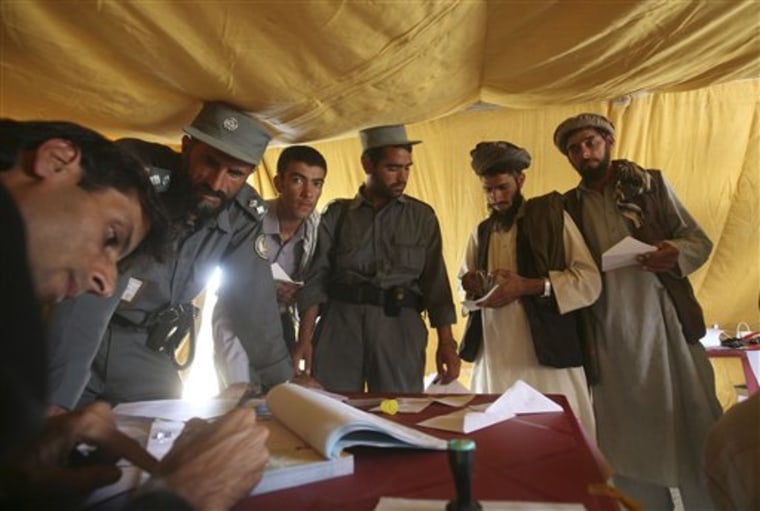A former Taliban ambassador said Monday that the hard-line militants sat with Afghan officials and Saudi King Abdullah over an important religious meal in Saudi Arabia late last month as the insurgency raged back home.
Abdul Salam Zaeef, the Taliban's former ambassador to Pakistan, denied that the get-together could be construed as peace talks. But President Hamid Karzai has long called for negotiations with the Taliban, and the meeting could spur future initiatives.
With U.S. and NATO forces suffering their deadliest year so far in Afghanistan, the top U.N. envoy, Kai Eide, said Monday that the war "has to be won through political means."
"And that means political engagement. Then comes a question — with whom do you engage? My general answer is that if you want to have relevant results you must speak to those who are relevant," Eide told a news conference. "But these are processes that are very difficult to initiate. Nevertheless, in my view a policy of engagement is the right policy."
A spokesman for Karzai's office declined to comment on the alleged meeting in Saudi Arabia.
But Zaeef said he was invited by Saudi King Abdullah to share Iftar — the meal that breaks the daily fast during the Muslim holy month of Ramadan. Taliban representatives, Afghan government officials and a representative for the powerful warlord Gulbuddin Hekmatyar were also at the meal, he said.
He said all parties talked socially with each other over the dinner but that they did not discuss any issue involving Afghanistan. It was not clear how many guests attended the dinner or where in Saudi Arabia it was held.
No peace talks on plate
Zaeef, who spent almost four years in the U.S. military prison in Guantanamo Bay, Cuba, said none of the representatives from the Taliban or Hekmatyar's group was authorized to carry out peace talks.
"This is not new, it's a kind of a guest celebration," Zaeef told The Associated Press, playing down the event's importance and implying that Abdullah hosts visitors all the time.
Taliban spokesman Qari Yousef Ahmadi also said Monday that there had been no peace talks.
Karzai last week said he has repeatedly asked Saudi Arabia's king to facilitate talks with the Taliban. Karzai said Afghan officials have traveled to Saudi Arabia and Pakistan in hopes of ending the country's now seven-year conflict but that so far there have been no negotiations.
Saudi Arabia is a leader of the Sunni Muslim world and the home of Islam's two holiest shrines in Mecca and Medina. It was one of a handful of countries that recognized the Taliban as rulers of Afghanistan in the 1990s.
Even after the Taliban's ouster, Saudi Arabia kept doors open for Taliban members to make the annual hajj, or Muslim pilgrimage.
While al-Qaida leader bin Laden, a Saudi, has frequently railed against the U.S.-allied kingdom, his sympathizers among the Afghan Taliban have been muted in their criticism.
Ahmadi, the Taliban spokesman, said Monday that the militant group is independent from al-Qaida. The U.S. and other Western countries will never accept a peace deal with al-Qaida, the group behind 9/11. That could provide incentive for Taliban leader Mullah Omar to cement his independence from bin Laden's group.
Zaeef said former Afghan Supreme Court Chief Justice Fazel Hadi Shinwari was among the government representatives present at the Iftar. He also said Bismillah Khan, Afghan army chief of general staff, was in Saudi Arabia, though it wasn't clear if he was part of the group that met with Abdullah.
Rising insurgency
News of the alleged Saudi meeting came on the eve of the seventh anniversary of the U.S. invasion that ousted the Taliban for harboring bin Laden. U.S. forces first launched airstrikes in Afghanistan on Oct. 7, 2001, less than a month after the Sept. 11 attacks in Washington and New York.
U.S. troops, with help from Northern Alliance militia members from Afghanistan's north, quickly pushed the Taliban out of Kabul and their southern stronghold in Kandahar, leading some U.S. officials to declare the Afghan fight a quick and easy victory.
But that original military success has turned into an increasingly violent counterinsurgency fight in recent years.
An unprecedented number of U.S. troops — about 32,000 — are in Afghanistan today, and the Pentagon plans to send several thousand more forces in the coming months. At least 131 U.S. troops have died in Afghanistan this year, as have 100 troops from other NATO nations.
U.S. officials have not indicated they are ready for any contacts with high-level Taliban leaders, though U.S. officials do encourage fighters to lay down arms and join the government's reconciliation program.
However, a senior British commander, Brig. Mark Carleton-Smith, was quoted over the weekend as saying that a decisive military victory in Afghanistan is impossible and that the Taliban may well be part of a long-term solution for peace.
The Afghan government began registering voters on Monday for next year's presidential polls, an election likely to be the most dangerous and challenging since the Taliban ruled the country. Karzai is seeking a second term.
A Taliban spokesman said the militia will not participate, and he warned other Afghans not to.
